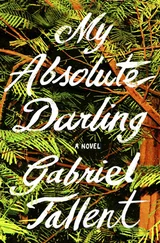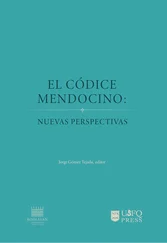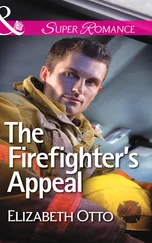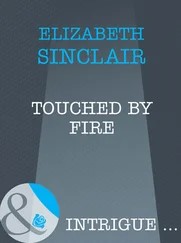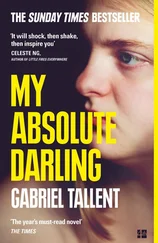He turned to Sean then to see how bad it was, what he had done, and in staring back at him Sean could feel by the contracted tensions of his face that it was a wrecked mask of disbelief and no reassurance whatsoever to the boy.
“It was a accident,” the boy said. “I’m sorry if I scared you.”
“Just you kneel down and put it on the ground,” she said. “In the leaves — yes, just like that. That was good.”
“It was a accident.”
“Sweetie, I know it was.” She sat up. With her face averted she said to Sean, “It could have been either of us. Did it nick you? Are you bleeding?”
He felt through his hair and held his hand out and they both looked: a perfect unbloodied hand stared back at them.
“A fraction of an inch,” he said in a voice soft as hers had been: conspirators. “I left the damn gun in the car. Fuck, I never even checked the safety, I was so sure it wasn’t loaded. It would’ve been my fault and he’d’ve had to live with it forever.”
“He doesn’t have to live with it now,” she said. “Or with you.”
She was on her feet, collecting the flashlight, and playing through the sapling audience the light paused and she said, “Jesus,” and he turned to look behind him at a young tan oak whose bark was gashed in sharp white.
She told the boy, “It’s okay. Look at my eyes, Dylan. Nobody’s hurt. You see that, don’t you? Nobody got hurt.”
“You did,” he said.
“Baby, I’m not hurt. Pawpaw didn’t hurt me, and you know what? We’re getting out of here. You’re coming with me.”
Dylan looked down at the gun and she said, “No, leave it.” Then changed her mind. “I’m taking it,” she told Sean, “because that’s wisest, isn’t it?”
“You can’t think that,” Sean said.
“Tell me you’re okay to be left,” she said.
“A little stunned is all.”
“That’s three of us, then.”
Dylan was staring at him and Sean collected his wits to say clearly, “You know what a near miss is, don’t you, Dyl? Close but not quite? That bullet came pretty close, but I’m okay. Are you hearing me say it didn’t hurt me? Nod your head so I’m sure you understand.” The boy nodded. “We’re good, then, right? You can see I’m all right.” The boy nodded.
Esme said, “We need to go, Dylan. Look at you. You’re shivering.”
“Where are we going?”
“Far away from here, and don’t worry, it’s all right if we go. Tell him now that we can go.”
This was meant for Sean, and they watched as he took the full measure of what he had done and how little chance there was of her heeding what he said now: “Don’t disappear with him, Esme. Don’t take him away forever because of tonight. From now on my life will be one long trying to make this right to you. To him, too. Don’t keep him away. My life spent making up for this. I need you to believe me. I can make this right.”
“I want to believe you,” she said. “I almost want to believe you.”
Before he could think how to begin to answer that, the mother and child were gone.
He knew enough not to go after them. He knew enough not to go after them yet.
One time in the library in town a boy has a rat inside his shirt. Its head pokes out under the boy’s chin, its clawey hands clinging and whiskers quicked forward. It is as if Finn has never wanted anything before: this, this is her destiny, to be a girl with a rat inside her shirt. Wherever she goes the rat will hang on, the alert small subject of her gigantic solicitude. How long do you think a rat will last in the woods against foxes and ravens and owls and hawks. But if I was really careful and kept it in a cage and was really careful. Do you think a rat wants to be your little Gitmo prisoner, or do you think a rat wants to be free like you are.
Nights when the fog holds off they laze around the illicit summer fire, smoking and telling stories and feeding twigs to the flames for the love of seeing small things burn, story after story, and there is Finn, almost seven, riding the high end of a canted redwood log in the dark. Mary, too, tells stories. Whenever Mary tells how Finn was born, Finn feels both beloved and ashamed, her helpless, ridiculous baby-self held up for them to dote on. That story ends with Mary crying in ever-renewed astonishment: Finn you were so beautiful! Finn works her arms from too-long sleeves and pulls her knees to her chest under the sloppy tent of Goodwill sweater smelling of the grown man who gave it away. Who smoked. Who was not her father, because she’s asked and Mary shook her head. The baggy sweater hem covers the boots so only their toes show, and she evens the boot toes so neither is ahead, neither is winning, not the left, not the right, old black boot toes in a setting of moss and fingerlength ferns and upthrust mushrooms whose caps are pale, pushy, tender, mute. A boot toe edges into the gang of mushrooms. One is uprooted and maimed by the slow back-and-forthing of the toe of the boot. Then she is sorry. Finn shuts her eyes and fills up with sorriness.
That is killing , Finn.
For a while she is absorbed in accusing herself, then blame loses its electrical charge and if she wants that absorption again another mushroom will have to die. Boredom nudges her boot toe close to another cocky little button of rooted aliveness.
What is that like: not to be able to move out of the way.
Another night, that summer or the summer after. If firelight flashes high enough there’s laughter, first because it’s a freaking face up there in the dark, then because it’s a little kid . Now and then Finn has come down when coaxed, and that was a mistake. They may not intend it thus, but their solicitude is an oblique condemnation of Mary. Finn resents this even if her mother doesn’t.
Aren’t you cold in just that sweater and your poor legs bare? And Jesus look how scratched up.
How long since you seen chocolate? — I think I got some somewhere.
My little girl is your age just about and she can say her ABCs, can you say your ABCs?
In this full-moon circle there’s a stranger, though the grown-ups don’t at first know that, each person assuming the lean bearded dude with the hostile vibe arrived with somebody else. Afterward no one will own up to having told him about the circle, but that could have been from remorse at showing the kind of piss-poor judgment that fucks up everyone’s night. Finn who can go a long while unseen has been found out: he has noticed her. He has called, “What’s your name?” and gotten no response. The wiry dark shrub of his beard parts again, the teeth asking, “What’s your name?” Finn’s hesitation lasts long enough to offend him down there in his bared-nerve world and he shouts, “Don’t answer then you autistic little shit, not like I give a fuck.” Finn is being, for the first time, hated : her nerves memorize the shock. And him: she memorizes him , this shirtless shaven-headed hater, brows heavy and meaningful in contrast to the round gleaming exposure of his forehead, and, inked on the left upper slab of his chest, a tattoo, a spiral, big as her handprint would be if she left a handprint on his bare, slightly sweating, hard-breathing chest.
“Hey,” someone, not Mary, commands gently. “Hey, come on now. Hey.”
Another voice says, “Way disproportionate, man, going off on a kid like that.”
Someone else says, “Look, she never answers.” Adding, “But it’s not autism.”
Someone says, “Maybe, man, you should apologize to Finn.”
He says, “Finn.”
Mary, at last: “You know her name.”
“Finn,” he calls up to her. “Finn, man, I’m sorry, I lost it.”
Читать дальше



